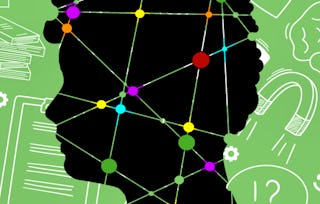A challenging but fascinating topic on the way to achieving self-knowledge is the unconscious. For well over a century, psychologists, philosophers, and many others have posited a level of mentality that is not immediately open to introspection; some would even say that certain unconscious elements cannot be known through introspection. This course will examine some of the most influential ideas about the unconscious starting with the work of Sigmund Freud, and follow the development of theories of the unconscious all the way to present research in experimental psychology. But be warned: some of the things you may learn about your unconscious mind may be surprising, and possibly even disturbing!

Know Thyself - The Value and Limits of Self-Knowledge: The Unconscious

Know Thyself - The Value and Limits of Self-Knowledge: The Unconscious

Instructor: Mitchell Green
92,354 already enrolled
Included with
822 reviews
What you'll learn
Gain an appreciation of the relation of methods of learning about oneself that do not depend on introspection.
Become familiar with contemporary research in experimental social psychology, philosophy, and neuroscience into the emotions and the unconscious.
Understand the role of affect in decision making, and self-deception.
Be able to identify and analyse unconscious mechanisms motivating own and other people's actions.
Skills you'll gain
Details to know

Add to your LinkedIn profile
See how employees at top companies are mastering in-demand skills

There are 6 modules in this course
Here you will get an overview of this course, including the topics covered and questions addressed, as well as what you need complete the course.
What's included
3 readings1 discussion prompt
In this first week of the course we will acquaint ourselves with the ideas of Sigmund Freud, who is probably the most famous advocate and practitioner of psychoanalysis. Shockingly for his time, Freud proposed that many facts of human behavior, including the mistakes we make, what we dream, as well as much behavior that seems on the surface to be irrational, are to be explained as being due to forces in our minds of which we are not conscious. We will look at Freud's reasons for this hypothesis and consider whether those reasons are compelling.
What's included
9 videos8 readings5 assignments5 discussion prompts
In this second week of the course we explore some developments in psychoanalytic theory that were dominant in the middle of the 20th Century. Focusing on the work of Anna Freud (Sigmund Freud's youngest daughter) and Melanie Klein, we will consider some psychoanalytic themes that emerged after Sigmund's death. Both of A. Freud and Klein were intensely interested in the psychological development of children, and we will learn about some of their ideas on this topic. Also, we will consider some phenomena that have potential resonance for our daily lives such as transference, reaction-formation, and what is now termed "gaslighting".
What's included
8 videos8 readings5 assignments4 discussion prompts
Much of the last three decades of research related to the unconscious mind has focused on its automatic character, and draws attention to the vast extent of cognitive and affective processing that occur with little or no conscious effort. Such processing is thought to have been evolutionarily adaptive in the past, as well as to simplify our daily lives even now. But these processes can also be hard to modify if they are not working for us, and may account for certain biases that seem to perpetuate some current forms of injustice in many of the world's societies. In this third week of the course we will learn about the "adaptive unconscious", paying attention both to the benefits it confers and the challenges it raises.
What's included
11 videos7 readings5 assignments4 discussion prompts
In this final module we will consider the relation between emotions and rationality. These are popularly thought to be at odds with one another, and many people hold that to be rational, one must keep emotions at bay. With a focus on the work of neuroscientist Antonio Damasio, we will consider reasons for thinking that one important kind of rationality could not function properly without emotions.
What's included
11 videos7 readings5 assignments3 discussion prompts
Apply your knowledge of the unconscious!
What's included
5 readings1 peer review1 discussion prompt
Instructor

Offered by
Explore more from Philosophy
 Status: Preview
Status: PreviewThe University of Edinburgh
 Status: Free Trial
Status: Free TrialAmerican Psychological Association
 Status: Preview
Status: PreviewUniversity of Toronto
 Status: Preview
Status: PreviewUniversiteit Leiden
Why people choose Coursera for their career

Felipe M.

Jennifer J.

Larry W.

Chaitanya A.
Learner reviews
- 5 stars
80.77%
- 4 stars
14.72%
- 3 stars
3.04%
- 2 stars
0.60%
- 1 star
0.85%
Showing 3 of 822
Reviewed on Apr 12, 2022
Nice information to understand about our mind how to take make decision making thank u for sirI enjoyed the mediative sound and bamboo breathing Thank u sir
Reviewed on Aug 1, 2020
I thought that the information presented in the class was clear and easy to understand. The quizzes and discussions reinforced the learning experience.
Reviewed on Mar 24, 2024
Very pleasant course and I learnt a lot about a good amount of content that was in different sectors but all relatable to the subject and course material.

Open new doors with Coursera Plus
Unlimited access to 10,000+ world-class courses, hands-on projects, and job-ready certificate programs - all included in your subscription
Advance your career with an online degree
Earn a degree from world-class universities - 100% online
Join over 3,400 global companies that choose Coursera for Business
Upskill your employees to excel in the digital economy
Frequently asked questions
To access the course materials, assignments and to earn a Certificate, you will need to purchase the Certificate experience when you enroll in a course. You can try a Free Trial instead, or apply for Financial Aid. The course may offer 'Full Course, No Certificate' instead. This option lets you see all course materials, submit required assessments, and get a final grade. This also means that you will not be able to purchase a Certificate experience.
When you purchase a Certificate you get access to all course materials, including graded assignments. Upon completing the course, your electronic Certificate will be added to your Accomplishments page - from there, you can print your Certificate or add it to your LinkedIn profile.
Yes. In select learning programs, you can apply for financial aid or a scholarship if you can’t afford the enrollment fee. If fin aid or scholarship is available for your learning program selection, you’ll find a link to apply on the description page.
More questions
Financial aid available,
¹ Some assignments in this course are AI-graded. For these assignments, your data will be used in accordance with Coursera's Privacy Notice.

